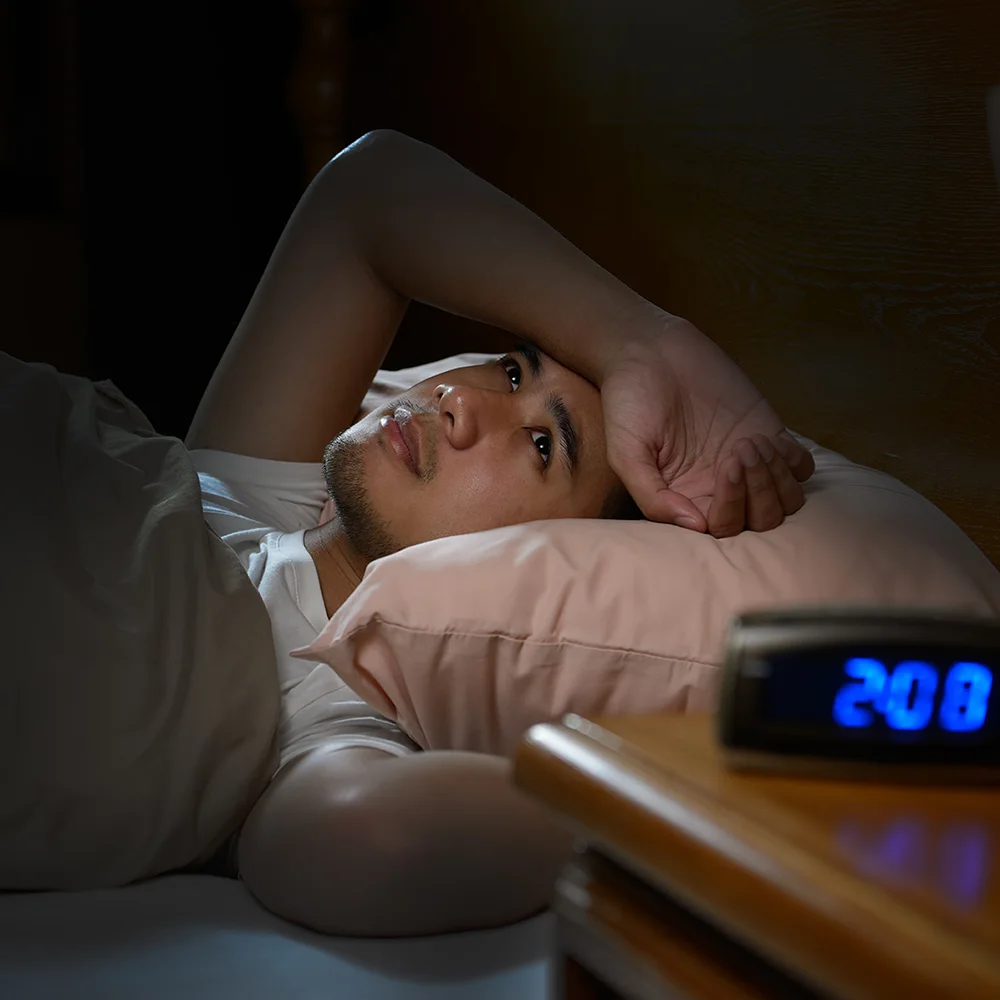Here's what we'll cover
Here's what we'll cover
You may have noticed your diet affects how you feel both physically and mentally. But could your diet be affecting your anxiety levels? Can changing the foods you eat help lower your anxiety?
Research tells us 13 foods may help reduce your anxiety symptoms.
What is anxiety?
Anxiety disorders involve an excessive feeling of worry or fear. It is related to the nervous system and the fight-or-flight response. The fight-or-flight response begins when you’re exposed to a perceived threat, and your nervous system prepares you to fight off the threat or run away.
The exact cause of anxiety is poorly understood. Multiple factors likely play a role. Some of the risk factors for anxiety include (Chand, 2021):
Family history and genetics
Alcohol or substance abuse
Trauma
Life experiences
Panic attacks
Some medications
Stress
Anxiety is one of the most common mental health conditions. There are many different types of anxiety disorders, including generalized anxiety disorder, specific phobias, social anxiety disorder, agoraphobia, panic disorders, and separation anxiety disorder (Chand, 2021).
Symptoms of anxiety
Anxiety causes both physical and psychological symptoms, such as (Chand, 2021):
Fear of losing control or getting injured
Fear of judgment or interacting with other people
Feelings of general worry or fear
Poor memory and trouble concentrating
Increased heart rate and palpitations
Shortness of breath
Digestive distress (nausea, vomiting, diarrhea, constipation, appetite changes)
Chills, shaking, dizziness, muscle tensions, and loss of consciousness
Agitation and mood changes
Avoiding situations or people that may trigger symptoms
Hyperventilating
Pacing and restlessness
You can manage your anxiety through medical interventions, like anti-anxiety medications, antidepressants, and working with a trained mental health professional in therapy. Lifestyle changes, such as increasing physical activity, practicing stress management techniques, meditating, and eating a healthy diet, can help too. (Chand, 2021).
Foods that help reduce anxiety
Your diet is vital for your overall health and well-being. The nutrients in foods create reactions in the body that affect your metabolism, mood, energy levels, hormones, and sleep.
Here are some science-backed foods that may be able to help reduce anxiety symptoms:
1. Dark chocolate
Adding some dark chocolate to your diet may help ease anxiety symptoms. Dark chocolate contains a type of antioxidants called flavonoids or flavonols. Research suggests that the flavonols in chocolate help boost the mood and may even lower your risk for conditions like Alzheimer’s disease and stroke (Nehlig, 2013).
Antioxidants help protect cells from oxidative stress and free radical damage. Flavonols protect the neurons and their connections in the brain to help protect your mental health (Nehlig, 2013).
One study showed some evidence that people who eat dark chocolate are less likely to report symptoms of depression (Jackson, 2019).
Try to choose dark chocolate varieties with a higher percentage of cocoa and lower sugar contents. It can be easy for many people to overeat chocolate. The recommended serving size for chocolate is about 1 oz.
2. Legumes
Legumes are plants that grow their seeds inside of a pod. Examples of legumes include black beans, green peas, chickpeas, lentils, navy beans, and peanuts.
Legumes are good sources of protein and fiber. Research suggests a diet high in fiber may reduce the risk of depression and anxiety symptoms (Taylor, 2020).
Fiber also helps slow digestion and keep blood sugar levels more stable throughout the day (McRae, 2018). Swings in your blood sugar level can lead to fluctuating energy levels and feeling like you’re “crashing” throughout the day.
3. Fermented foods
Fermented foods contain probiotics, which are healthy bacteria. Probiotic foods can help you maintain a healthy balance of good bacteria in your gut, which together make up the gut microbiome. Types of fermented foods include sauerkraut, kimchi, miso, yogurt, and kefir.
The exact effects of probiotics on mental health aren’t fully understood. Still, some research supports a relationship between eating probiotics and reducing anxiety symptoms (Hilimire, 2015).
A 2019 meta-analysis reported that probiotics appear to help depression and anxiety symptoms (Liu, 2019). Also, including probiotics in your diet may help improve your digestive health and immune system and reduce cancer risk (Shi, 2016).
4. Fatty fish
Salmon, mackerel, tuna, sardines, trout, and herring are all types of fatty fish high in omega-3 fatty acids. Fatty fish is the best source of omega-3s, which include the health-boosting compounds eicosapentaenoic acid (EPA) and docosahexaenoic acid (DHA).
Omega-3s help reduce inflammation and interact with neurotransmitters to support your brain function. One study found that eating salmon three times per week helped improve emotional control and signs of anxiety (Hansen, 2014).
5. Brazil nuts
Brazil nuts are a good source of healthy fats, plant protein, and micronutrients. They are exceptionally high in the antioxidants selenium and vitamin E. Both help to lower inflammation and protect against cell damage. Some research suggests that selenium intake is associated with improved mood, reduced anxiety, and lower risk for depression (Banikazemi, 2016).
6. Leafy green vegetables
Eating your vegetables is good for all areas of your health, including your mental health. Leafy greens are full of B-vitamins (folate, B-12, and more) and minerals like magnesium.
A 2018 study suggests that magnesium helps protect against conditions affecting the brain, like migraines, depression, chronic pain, anxiety, and stroke (Kirkland, 2018). Leafy greens like spinach and swiss chard are both high in magnesium.
Other leafy green vegetables include kale, romaine lettuce, arugula, collard greens, and cabbage.
7. Chamomile tea
Chamomile tea is a type of herbal tea made from the chamomile flower. This herbal tea has been used throughout history for its antioxidants and potential anti-inflammatory and calming effects.
Research shows drinking chamomile tea daily may help significantly reduce the symptoms of generalized anxiety disorder (Mao, 2014).
8. Green tea
The amino acid L-theanine in green tea is associated with improved mood and lowered stress and anxiety symptoms.
A 2020 study found that 200–400 mg of L-theanine daily helps reduce stress and anxiety in people going through stressful conditions (Williams, 2020).
There is less caffeine in green tea than coffee, so replacing an afternoon coffee with tea may help reduce stress and is less likely to interfere with your sleep later.
9. Turkey
Turkey contains the amino acid tryptophan, which can be used by the body to create serotonin. Serotonin is one of the neurotransmitters that affects your mood. Research shows eating foods high in tryptophan increases mood and decreases anxiety and depressive symptoms (Lindseth, 2014).
10. Blueberries
Berries are full of fiber, antioxidants, and beneficial nutrients. Antioxidants help protect cells from damage and promote brain health. A 2020 research study explored the relationship between eating wild blueberries and anxiety. The study found that blueberries help reduce inflammation and depression symptoms (Fisk, 2020).
11. Oranges
Citrus fruits like oranges are high in vitamin C, an important antioxidant to help reduce inflammation and prevent cell damage. Research suggests that vitamin C may be effective at reducing anxiety (de Oliveira, 2015).
Other types of citrus fruits include lemons, limes, grapefruit, and tangerines.
12. Turmeric
Turmeric is a spice that gives food a yellow color. It’s most commonly used to add flavor and color to curry. Turmeric contains a substance called curcumin, which may be effective in treating symptoms of some psychiatric disorders.
A 2020 meta-analysis found that curcumin may help improve the symptoms of anxiety and depression (Fusar-Poli, 2020).
13. Pumpkin seeds
Pumpkin seeds are another source of tryptophan and provide both potassium and zinc. Zinc helps to support the nervous system and brain development. Research suggests zinc may help improve mood disorders and reduce anxiety symptoms (Tahmasebi, 2017).
Foods that may increase anxiety
While many foods can help lower anxiety, other foods might increase anxiety symptoms, such as:
Sugar
High sugar intake may lead to increased inflammation and inconsistent energy levels. Research suggests that a diet high in added sugar is associated with higher anxiety levels (Masana, 2019).
Examples of foods high in sugar include desserts, juice, soda, ice cream, and cereals.
Caffeine
Caffeine stimulates the nervous system and helps people feel more awake. While this may provide a pick-me-up when you feel tired, it could also stimulate your nerves, worsening anxiety symptoms.
A 2021 research study found that students who consumed caffeine consumption also reported higher anxiety symptoms and depression (Bertasi, 2021).
Processed foods
When food is processed, the vitamins and minerals are often removed. Many processed foods are high in sugar, saturated fat, and salt. Research suggests a diet high in processed foods is associated with higher anxiety levels (Masana, 2019).
If you’re experiencing anxiety symptoms, there are options to reduce your symptoms. Healthy habits like exercising and a healthy diet may help reduce your symptoms. Don’t hesitate to talk to a mental health professional if your anxiety is affecting your daily life.
DISCLAIMER
If you have any medical questions or concerns, please talk to your healthcare provider. The articles on Health Guide are underpinned by peer-reviewed research and information drawn from medical societies and governmental agencies. However, they are not a substitute for professional medical advice, diagnosis, or treatment.
Banikazemi Z, Mirzaei H, Mokhber N, & Ghayour Mobarhan M. (2016). Selenium intake is related to beck's depression score. Iranian Red Crescent Medical Journal, 18 (3): e21993. doi: 10.5812/ircmj.21993. Retrieved from https://www.ncbi.nlm.nih.gov/pmc/articles/PMC4884624/
Bertasi R, Humeda Y, Bertasi T, Zins Z, Kimsey J, & Pujalte G. (2021). Caffeine intake and mental health in college students. Cureus, 13 (4): e14313. doi: 10.7759/cureus.14313. Retrieved from https://www.ncbi.nlm.nih.gov/pmc/articles/PMC8099008/
Chand SP, Marwaha R. (2021). Anxiety. In: StatPearls [Internet]. Retrieved from https://www.ncbi.nlm.nih.gov/books/NBK470361/
de Oliveira IJ, de Souza VV, Motta V, & Da-Silva SL. (2015). Effects of oral vitamin C supplementation on anxiety in students: a double-blind, randomized, placebo-controlled trial. Pakistan Journal of Biological Sciences, 18 (1): 11–18. doi: 10.3923/pjbs.2015.11.18. Retrieved from https://pubmed.ncbi.nlm.nih.gov/26353411/
Fisk J, Khalid S, Reynolds SA, & Williams CM. (2020). Effect of 4 weeks daily wild blueberry supplementation on symptoms of depression in adolescents. The British Journal of Nutrition, 1–8. doi: 10.1017/S0007114520000926. Retrieved from https://pubmed.ncbi.nlm.nih.gov/32151287/
Fusar-Poli L, Vozza L, Gabbiadini A, Vanella A, Concas I, Tinacci S, et al. (2020). Curcumin for depression: a meta-analysis. Critical Reviews in Food Science And Nutrition, 60 (15): 2643–2653. doi: 10.1080/10408398.2019.1653260. Retrieved from https://pubmed.ncbi.nlm.nih.gov/31423805/
Hansen AL, Olson G, Dahl L, Thornton D, Grung B, Graff IE, et al. (2014). Reduced anxiety in forensic inpatients after a long-term intervention with Atlantic salmon. Nutrients, 6 (12): 5405–5418. doi: 10.3390/nu6125405. Retrieved from https://pubmed.ncbi.nlm.nih.gov/25431880/
Hilimire MR, DeVylder JE, & Forestell CA. (2015). Fermented foods, neuroticism, and social anxiety: an interaction model. Psychiatry Research, 228 (2): 203–208. doi: 10.1016/j.psychres.2015.04.023. Retrieved from https://pubmed.ncbi.nlm.nih.gov/25998000/
Jackson SE, Smith L, Firth J, Grabovac I, Soysal P, Koyanagi A, et al. (2019). Is there a relationship between chocolate consumption and symptoms of depression? a cross-sectional survey of 13,626 US adults. Depression and Anxiety, 36 (10): 987–995. doi: 10.1002/da.22950. Retrieved from https://pubmed.ncbi.nlm.nih.gov/31356717/
Kirkland AE, Sarlo GL, & Holton KF. (2018). The role of magnesium in neurological disorders. Nutrients, 10 (6): 730. doi: 10.3390/nu10060730. Retrieved from https://www.ncbi.nlm.nih.gov/pmc/articles/PMC6024559/
Lindseth G, Helland B, & Caspers J. (2015). The effects of dietary tryptophan on affective disorders. Archives of Psychiatric Nursing, 29 (2): 102–107. doi: 10.1016/j.apnu.2014.11.008. Retrieved from https://www.ncbi.nlm.nih.gov/pmc/articles/PMC4393508/
Liu RT, Walsh R, & Sheehan AE. (2019). Prebiotics and probiotics for depression and anxiety: a systematic review and meta-analysis of controlled clinical trials. Neuroscience and Biobehavioral Reviews, 102, 13–23. doi: 10.1016/j.neubiorev.2019.03.023. Retrieved from https://www.ncbi.nlm.nih.gov/pmc/articles/PMC6584030/
Mao JJ, Li QS, Soeller I, Rockwell K, Xie SX, & Amsterdam JD. (2014). Long-term chamomile therapy of generalized anxiety disorder: a study protocol for a randomized, double-blind, placebo-controlled trial. Journal of Clinical Trials, 4 (5): 188. doi: 10.4172/2167-0870.1000188. Retrieved from https://www.ncbi.nlm.nih.gov/pmc/articles/PMC5650245/
Masana MF, Tyrovolas S, Kolia N, Chrysohoou C, Skoumas J, Haro, JM, et al. (2019). Dietary patterns and their association with anxiety symptoms among older adults: the ATTICA study. Nutrients, 11 (6): 1250. doi: 10.3390/nu11061250. Retrieved from https://www.ncbi.nlm.nih.gov/pmc/articles/PMC6627391/
McRae MP. (2018). Dietary fiber intake and type 2 diabetes mellitus: an umbrella review of meta-analyses. Journal of Chiropractic Medicine, 17 (1): 44–53. doi: 10.1016/j.jcm.2017.11.002. Retrieved from https://www.ncbi.nlm.nih.gov/pmc/articles/PMC5883628/
Nehlig A. (2013). The neuroprotective effects of cocoa flavanol and its influence on cognitive performance. British Journal of Clinical Pharmacology, 75 (3): 716–727. doi: 10.1111/j.1365-2125.2012.04378.x. Retrieved from https://www.ncbi.nlm.nih.gov/pmc/articles/PMC3575938/
Shi LH, Balakrishnan K, Thiagarajah K, Mohd Ismail NI, & Yin OS. (2016). Beneficial properties of probiotics. Tropical Life Sciences Research, 27 (2): 73–90. doi: 10.21315/tlsr2016.27.2.6. Retrieved from https://www.ncbi.nlm.nih.gov/pmc/articles/PMC5031164/
Tahmasebi K, Amani R, Nazari Z, Ahmadi K, Moazzen S, & Mostafavi, SA. (2017). Association of mood disorders with serum zinc concentrations in adolescent female students. Biological Trace Element Research, 178 (2): 180–188. doi: 10.1007/s12011-016-0917-7. Retrieved from https://pubmed.ncbi.nlm.nih.gov/28064416/
Taylor, A. M., & Holscher, H. D. (2020). A review of dietary and microbial connections to depression, anxiety, and stress. Nutritional Neuroscience, 23 (3): 237–250. doi: 10.1080/1028415X.2018.1493808. Retrieved from https://pubmed.ncbi.nlm.nih.gov/29985786/
Williams JL, Everett JM, D'Cunha NM, Sergi D, Georgousopoulou EN, Keegan RJ, et al. (2020). The effects of green tea amino acid L-Theanine consumption on the ability to manage stress and anxiety levels: a systematic review. Plant Foods For Human Nutrition, 75 (1): 12–23. doi: 10.1007/s11130-019-00771-5. Retrieved from https://pubmed.ncbi.nlm.nih.gov/31758301/












